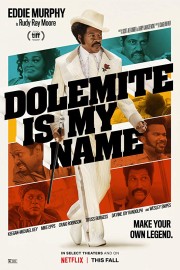Dolemite is My Name
Before digging into the way Craig Brewer and Eddie Murphy shine in this biopic of Rudy Roy Moore, it’s worth noting something about the writers of the film. This is the fifth cinematic biography written by Scott Alexander and Larry Karaszewski in 25 years, and it became clear in this one, and thinking back about the previous four (“Ed Wood,” “The People vs. Larry Flynt,” “Man on the Moon” and “Big Eyes,” though the last one remains unseen by me) that they definitely have a type of individual they enjoy writing about. It’s not just the idea that Moore, like Ed Wood, Larry Flynt and Andy Kaufman, have garnered cult status over the years for their bravado and work, it’s that each one started on the fringes, and took their shot at significance. There’s a moment in this film where Moore, who has rejuvenated his career as a brash comedian and early rapper after it had stalled out as a more traditional R&B singer, is trying to line up financing for a film he wants to make of his Dolemite character, and he’s trying to talk his record company into financing the film. They see it as an advance towards future profits, and warn him that if it fails, he’ll be indebted to them for the rest of his life. He eventually has to go back to them to complete the film, but at the time, he bets on himself, puts his own money into it, and is off to the races because of his bravado and energy. Ed Wood bet on himself in trying to become the next Orson Welles, Larry Flynt bet on himself when he went before the Supreme Court, and Andy Kaufman bet on himself with his singular style of comedy, even when it erased chances on shows like “Saturday Night Live” and “Taxi.” Moore is in that same vein, and this is exactly the type of character Eddie Murphy has needed for years.
There is a shine and energy to Murphy as Rudy Roy Moore that hasn’t been seen since “Dreamgirls,” and hasn’t been on display consistently in decades. Like with Moore and Dolemite, you feel like Murphy knows that this is his one shot to get that early swagger back that nearly two decades of voicing Donkey in the “Shrek” movies, and starring in family fare like “Meet Dave” and “Dr. Dolittle,” or safe vehicles like “Showtime” or “Tower Heist,” seemed to sap from his persona. Even more than “Dreamgirls,” it feels as though Murphy hasn’t been this loose since “Bowfinger,” when he had Steve Martin and a great supporting cast to play off of, and damn was it great to feel that again coming from Murphy. Murphy knows that he has, not just in his supporting cast here that includes Craig Robinson, Keegan-Michael Key, Kodi Smit-McPhee, Da’Vine Joy Randolph, Wesley Snipes and more, but material from Alexander and Karaszewski and a director in “Hustle & Flow’s” Brewer he can trust to do their jobs, and rein him in if things go off the rails. Unlike Moore, Murphy is in control of his situation, and his support system is designed for success. This is the best we’ve seen out of Murphy in decades.
As a story told, it follows the biopic formula to the letter, but it’s the way Brewer populates this story with actors in these characters, and the odd stops in Moore’s narrative, that give the film a personality and joy that is easy to get sucked in to. It’s wonderful seeing Snoop Dogg appear as an in-store DJ at the record store that Moore is working at, and will later sell his Dolemite album out of, early on in the film; he’s not a great actor, but he’s a phenomenal presence, and he plays off of Murphy really well in those early scenes. Keegan-Michael Key is fun as Jerry Jones, a playwright who wants to illuminate serious issues for African-Americans whom Moore ropes in to write his insane ideas for “Dolemite,” the movie the second half of the film will be devoted to making. As D’Urville Martin, the actor and director Moore somehow gets to direct the film, Wesley Snipes is the most engaging he’s been in a long time on-screen, and honestly, it took me a while to realize it was him in the role, though I knew he was in the movie. The star of the movie after Murphy, however is Da’Vine Joy Randolph as Lady Reed, a woman Moore sees slugging her lousy ex in a small bar he does his act in one night, and gets her on stage to both help her and her kid out financially, but also because she has a real presence to her; they never become romantically involved, but she continues with him throughout the adventure of making “Dolemite,” and she’s a force of nature in the role, and has a moment near the end of the film where she thanks Moore for giving her a chance to see someone like her on the big screen finally. That’s as poignant a message about representation, something that mattered to Moore as he started making “Dolemite,” as anyone has put in a film about making movies. What we see of the film Moore set out to make is not great, but it looks like a Hell of a lot of fun. Ed Wood did the same thing in his films. It’s inspiring seeing people like them, who don’t fit the mold of important figures in filmmaking, take their shot, and make something that lasts, whether it is great art or not.










